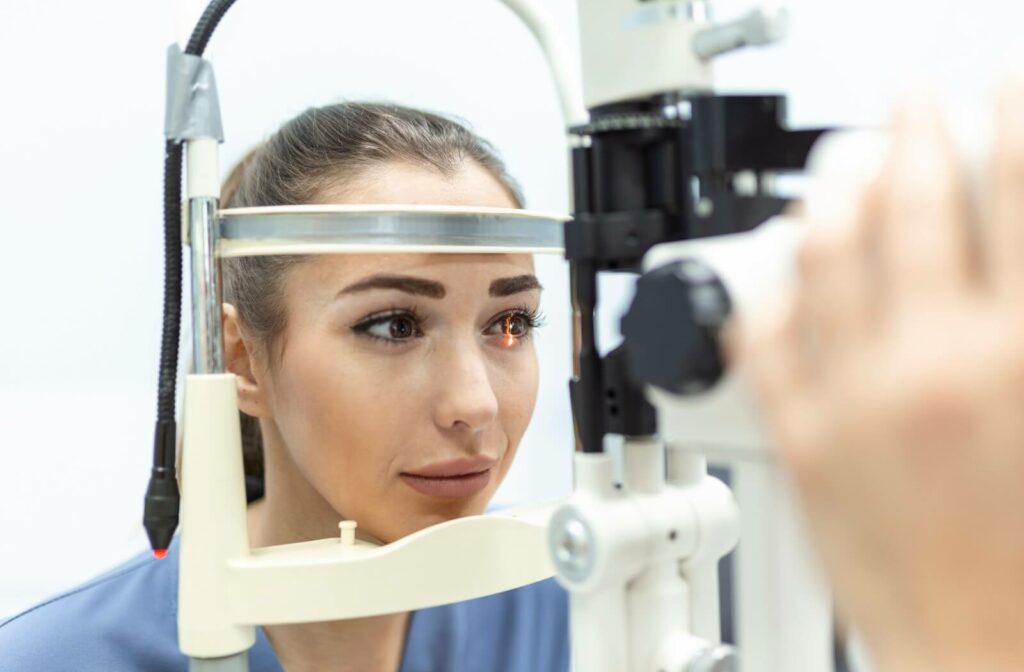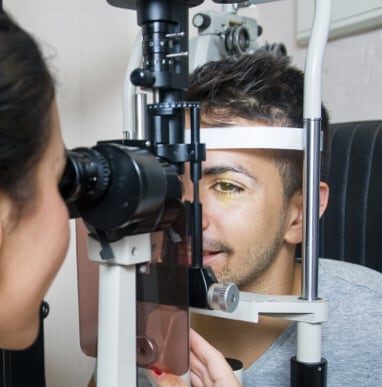Managing diabetes comes with plenty of daily responsibilities, but your eye health deserves a place at the top of that list. A diabetic eye exam is more than a routine check-up; it’s a focused, proactive assessment of your internal eye health that’s designed to catch potential issues before they become serious.
Diabetes can quietly affect your eyes long before noticeable symptoms appear. That’s why regular visits to your optometrist are one of the most effective ways to protect your vision and stay ahead of changes caused by this common and lifelong condition.
How Diabetes Can Affect Your Eyes
Diabetes affects more than just your blood sugar. It can also take a serious toll on your eyes. Some eye conditions linked to diabetes can develop without noticeable symptoms, while others might show early warning signs like blurry vision, eye pressure, or sudden changes in sight. That’s why staying on top of your eye health with regular diabetic eye exams is so important.
If you’ve been diagnosed with diabetes or are managing it long term, you’re not alone. Around 1.2 million Americans are diagnosed with diabetes every year, joining the millions already living with it.
This condition occurs when your body doesn’t produce enough insulin (Type 1) or can’t use it properly (Type 2), causing blood sugar to rise. Over time, that extra sugar in your bloodstream can damage delicate parts of your body, including your eyes.
Eye Conditions Linked to Diabetes
Diabetes can quietly affect your eye health over time, often before you notice any changes in your vision. Elevated blood sugar levels may damage the small, delicate structures inside your eyes, leading to several common conditions:
Diabetic Retinopathy
High blood sugar can weaken or block blood vessels in the retina. Damaged vessels may leak, swell, or bleed over time. In advanced stages, fragile new blood vessels can form, significantly increasing the risk of permanent vision loss.
Diabetic Macular Edema
When fluid leaks into the macula, the part of your retina responsible for clear central vision, this can swell and distort your sight. Such swelling may affect your ability to comfortably read, drive, or see fine details clearly.
Glaucoma
People with diabetes are about twice as likely to develop glaucoma during their lifetime. This condition occurs when pressure builds inside the eye, slowly damaging the optic nerve and, if left untreated, eventually causing permanent vision loss.
Retinal Detachment
Scar tissue caused by diabetic retinopathy can tug on the retina, pulling it away from the back of the eye. This serious complication needs immediate treatment to prevent sudden and permanent vision loss.
Recognizing the Signs of Diabetes-Related Eye Issues

While some of these conditions develop without noticeable symptoms, others may show early warning signs that shouldn’t be ignored. These signs can progress quickly without proper monitoring or treatment. If you have diabetes, keep an eye out for:
- Blurry or fluctuating vision
- Flashes of light or floaters
- Sudden or gradual loss of vision
- Pain or pressure in one or both eyes
Regular diabetic eye exams are an important way to stay proactive about your eye health and catch problems early, even if you haven’t noticed any symptoms or vision changes.
What to Expect From a Diabetic Eye Exam
A diabetic eye exam goes beyond a standard vision test. It’s a thorough checkup designed specifically to catch signs of diabetes-related damage in the eyes. During this exam, we’ll take a close look at your retina, optic nerve, and blood vessels.
We’ll keep an eye out for changes that might not affect your eyesight right away, but could lead to serious complications if left untreated.
To get the clearest view of your eye’s internal structures, we may use dilating drops. This simple step widens your pupils, allowing a more detailed look at areas that aren’t visible in a regular eye exam. By identifying problems early, a diabetic eye exam helps protect your vision long term.
We usually recommend booking this exam at least once a year if you have diabetes. These annual visits allow us to track changes over time and step in before issues become more serious.
Protect Your Vision
If you’re living with diabetes, staying ahead of your eye health is essential. Even with good blood sugar control, certain diabetic eye conditions can develop without early symptoms. That’s why annual diabetic eye exams are a key part of protecting your long-term vision.
These exams give your optometrist the chance to catch changes early and take action before they impact your sight. It’s all about staying proactive and feeling confident in your care.
Our experienced, trusted team is here to help you safeguard your vision and support your health, one visit at a time. We combine diagnostic technology with personalized care in a space that feels welcoming and familiar. Book your diabetic eye exam at Vision Care Center today.












